#something about the underlying tragedy of the great beasts
Explore tagged Tumblr posts
Text
wouldn't it be heartbreaking if the reason you can't have any of the great beast species as a spirit animal is because they are extinct. what if all the other grey wolves and golden eagles and elk in the world were wiped out by the impact of the wyrm's egg, and the individual great beasts were the only survivors of their kind. to the humans of erdas, these fifteen god-like figures are the only glimpse they'll ever have of species that disappeared before their race was even born.
of course, considering certain canon events, this would take a bit of tweaking to work. conor has had to protect his family's sheep from wolves all his life, cabaro's pride which does all the work for him is essential to his character, etc. however, subspecies that survived the impact could easily fill these roles. either way, it's an intriguing idea.
#and one i may or may not utilize in a revised history of erdas#i'll have to give it more thought#something about the underlying tragedy of the great beasts#their existence is a lonely one. they have each other but they are completely alone.#aliens in their own home#existing through the ages in a world that does not remember what they are or where they came from#they are worshipped and adored but they can never find the same comfort and kinship that they did when their lives were simple#and many of them would not go back but all of them agree#it's a high price to pay for greatness#text#a revised history of erdas#spirit animals#spirit animals books#spirit animals series#great beasts
11 notes
·
View notes
Text
MONTHLY MEDIA: May 2019
Here’s how I spent the month of May!
……….FILM……….
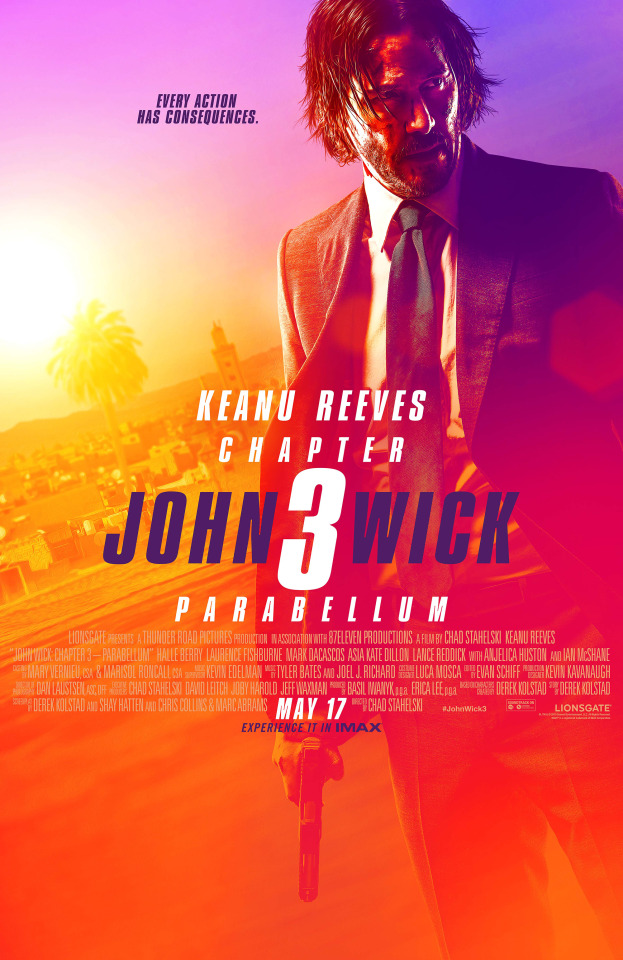
John Wick: Chapter 3 – Parabellum (2019) I don’t think I was mentally prepared to get right into the violence and the film doesn’t ease you into any of it. If anything, I found this chapter to rely on the combat more than the previous two and by the end, I was a little numb. Still a great film and perhaps I’ll feel differently on a second viewing. For now, I’d say it’s very good and has like...10 minutes too much fighting.
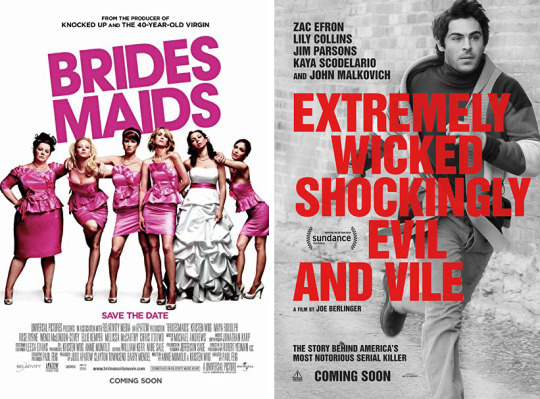
Bridesmaids (2011) Always great but in watching this I realized what makes the improv stand out from other films: the underlying storytelling. While there’s lots of back and forth between characters that are funny, it’s usually doing something else at the same time (showing characters competing and in conflict with each other, showing the casual report between friends, etc.) The humour never feels like it’s there because the movie is a comedy, but that we’re watching funny people live their lives. It really works.
Extremely Wicked, Shockingly Evil and Vile (2019) So I admit that I know only a surface level of info about Ted Bundy and what he did. With that in mind I found it frustrating that the movie took the perspective of “did he or didn’t he?” I get that the film’s perspective was that of Liz Kendall but then I wanted more concrete proof that he did it (not seeing the crimes, but through evidence in the courtroom). The one bit they did show (the teeth marks) felt flimsy and was undercut by Bundy’s rebuttal. I just didn’t vibe with the coy approach.
……….TELEVISION……….
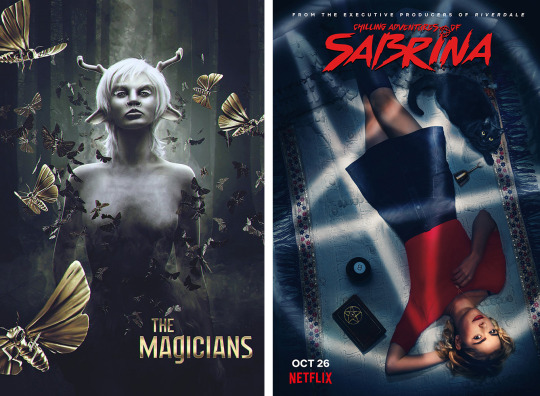
The Magicians (Episode 1.01 to 1.09) Having read the books, I had no interest watching a series that also centres around Quentin. Only after friends told me it doesn’t revolve around him did I try it out and it’s great! The casting is still a little too CW for me (you can tell if a character will eventually play a major role based on how conventionally attractive they are) but the overall dynamic works. The magic is still dangerous, the fighting is still petty, and the world is still as complex as the novels.
The Chilling Adventures of Sabrina (Episode 2.08 to 2.09) So ep 8 (with the mandrake) is peak Sabrina for me: a little horror, a little melodrama, and a fairly contained episode. Perhaps I’m longing for a different type of television but I really want this series to become something in the vein of Buffy where there’s a monster of the week and perhaps it all ties to a bigger plot. The season finale was fun and I mistook the Phantom of the Opera song for a current top 40 hit so...I’m out of touch in a whole bunch o ways.
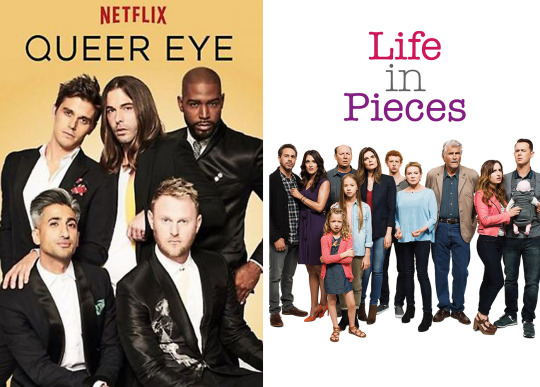
Queer Eye (Episode 3.01 to 3.08) Ugh what a great season.
Life in PIeces (Episode 1.01 to 1.04) It’s starting to grow on me. The format works well though I’d say their consistency (even within a single episode) varies. Maybe I just need more time with the characters but so far I’m just luke warm to it.
……….READING……….
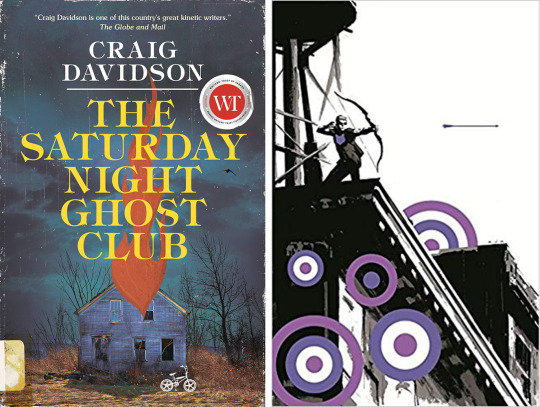
Saturday Night Ghost Club by Craig Davidson (Complete) Without giving up too much of the story, this is a heart wrenching read and one that is foreshadowed by the tone and content of the first chapter (a skill I really appreciate in both literature and film). It’s dark and light and human and really left an impression after I finished it.
Hawkeye by Matt Fraction & David Aja Omnibus by Matt Fraction, David Aja, Matt Hollingsworth, Chris Eliopoulos, and so many more (Complete) Seeing Avengers:Endgame made me long for a Hawkeye that I liked and in rereading this, I found what I needed. I cannot say enough kind things about this run. It’s singular and small in its focus and the art/direction is phenomenal. It at times feels gritty and grounded, and yet has a real spy thriller vibe to the overall tone. If you can get your hands on the omnibus then do it. It’s human and heroic and good-spirited and funny in a dry, world-weary way and Kate Bishop is a wonderful foil to Clint Barton (and vice versa).
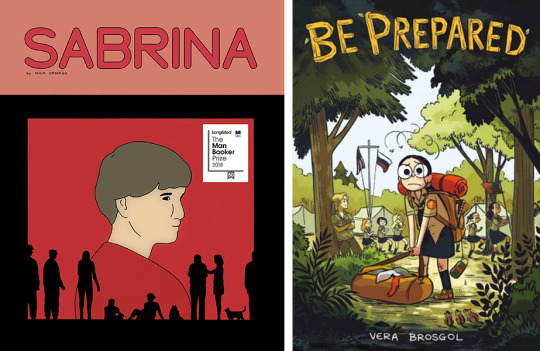
Sabrina by Nick Drnaso (Complete) Oof what a read. I knew the book dealt with the aftermath of a woman’s murder, but I didn’t realize it would be such a reflection on the modern media landscape. It deals with conspiracies, allegations of fake news, death threats, and the general paranoia that victims endure after a tragedy. This video essay says it all better than I could.
Be Prepared by Vera Brogsol (Complete) Charming and personal and while I don’t have many experiences with camp, I do feel a deep connection with a protagonist that never quite succeeds at fitting in with the “in” crowd. It’s a great all-ages read and is beautifully illustrated and I can’t say enough kind things about it.
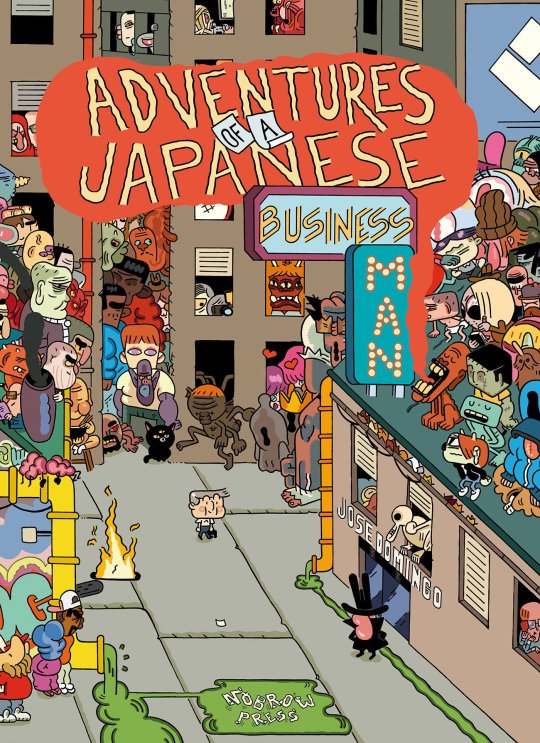
Adventures of a Japanese Businessman by Jose Domingo (Complete) Just fantastic. I picked this up after a glowing review from my friend and it didn’t disappoint. Silent and surreal, the series of unfortunate events told across each 4-panel page is a masterclass in setup and resolution. There are tiny 2-3 panel arcs happening all over and it truly rewards rereads. I loved every minute of it and can’t recommend it enough.
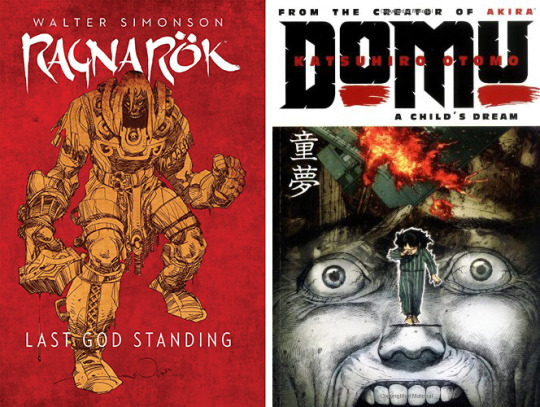
Ragnarök Volume 1: Last God Standing by Walt Simonson (Complete) It’s fun to read a comic about Thor and it not be the Marvel version: the mythology is a little different (closer to the myths), the tone is a little different (Thor and the gods have lost and Ragnarök has happened), and I’m sure there isn’t as much editorial influence since it’s wholly the creator’s vision. It’s fairly self-serious and the overall vibe is fairy 70s Heavy Metal, and it all works. Not necessarily my go-to tone, but it’s good at what it does and is refreshingly different.
Domu by Katsuhiro Otomo (Complete) Just fantastic. Akira was always a little overwhelmingly big (though no less impressive) so this smaller, more intimate story was right up my alley. It’s creepy and kinetic and beautiful and a really good read. It’s hard to come by in print, but if you can find it then I defo recommend.
……….AUDIO……….

Dedicated by Carly Rae Jepsen (2019) You know what? This album is a lot of fun and very good and you should check it out. I really wish it kept the energy of the first couple tracks all the way through, but I really just can’t hold every artist to the level of Andrew W. K.
……….GAMING……….
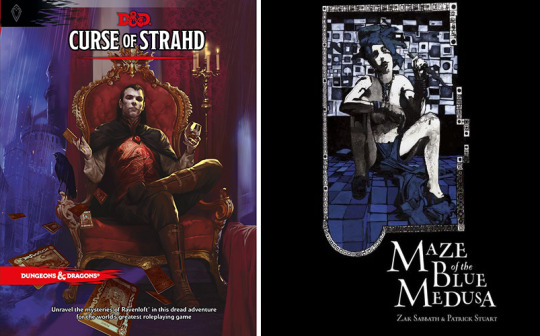
Curse of Strahd (Wizards of the Coast) What I love about this group is they often spend so much time discussing who is in charge of the money, avoid conflict with a ghost that is trying to kill them, and yet really want to pursue the mystery creature that was rummaging around the pantry two sessions earlier. Also they’re still in a haunted house with ominous chanting and undead everywhere.
Maze of the Blue Medusa (Satyr Press) The party has started to explore other parts of the maze (now moving away from the Lich-haunted gardens) and continue to find countless unsettling beasts and creatures. A couple near death experiences but overall, they’re doing well.
And that’s it! As always, I’m keen to hear your suggestions for what the read, watch, hear, and play next!
Happy Friday.
18 notes
·
View notes
Text
The Best Films of 2017 - Mid-Year List
There have already been many great films so far this year, so I felt it worth doing a run down of my favourite films of the year so far. These all reflect the cinema releases we’ve had so far in the UK in 2017 - for that reason this list includes some films that were released in the US in 2016. Enjoy, and I’d love to hear your thoughts on the best films of the year so far!
Honourable mentions: Their Finest, Colossal, Gifted
1. Get Out, dir. Jordan Peele

This film really knocked me for six, to such an extent that I simply had to see it twice in the cinema. It got even better upon a re-watch, when I was able to watch it with full knowledge of the characters’ underlying motives and the things to come. It’s a terrifying concept (the racism of an all-white suburb is taken to a horrifying extreme) executed with incredible panache, and you feel every emotion that Chris goes through thanks to Daniel Kaluuya’s excellent performance. Get Out also represents one of the most brilliantly communal experiences I’ve ever had at the cinema - I won’t spoil it, but let’s just say that the audience erupted into spontaneous applause at a key moment in the climax. Simply fantastic.
2. The Handmaiden, dir. Park Chan-wook
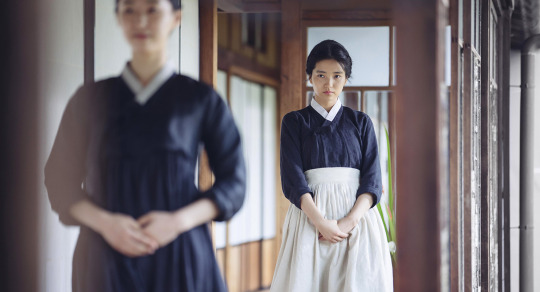
This film is exquisite - it’s first and foremost a beautiful boundary-smashing love story, and an absolutely marvellous tale of female defiance. It transplants Sarah Waters’ novel Fingersmith to 1930s Korea, and the story is effortlessly adapted to become intrinsically interwoven with its new setting. Sookee is a talented pickpocket plucked from a thieves den and sent as a handmaiden to trick a rich heiress into falling for a conman. To say any more would spoil the twists, but this film is just a masterwork of suspense, keeping you guessing throughout a series of interlocking pieces that take their time to reveal their secrets. I’ve seen the theatrical cut and the extended version, and they’re both great - you’re in for a treat with either.
3. Jackie, dir. Pablo Larrain

This is a film that soars on the strength of Natalie Portman’s incredible performance, which is complemented by Mica Levi’s haunting score. Portman’s performance is painfully vivid, with her agony and wretchedness coming through so intensely that it’s often uncomfortable to watch. Jackie is probably the best portrait of grief I’ve ever seen, and it sucks you into a famous historic event by providing an incredibly intimate perspective on it. This is great cinema, but be prepared for suffering.
4. A Cure for Wellness, dir. Gore Verbinski

This is a delightfully strange Gothic fairy tale of a film, and I’m amazed and impressed that a Hollywood studio gave Gore Verbinski a budget sufficient to pull it off with such beauty and style. I’ve seen this film attract love and hate in equal measure, but I adore it - the trailers set you up for a rehash of Shutter Island, but nothing could be further from the truth beyond the isolated setting. If I had to compare this to anything, I would compare it to Roger Corman’s Poe cycle of films from the 1960s - it has a similarly lurid sensibility and a deep-seated sense of fantastic romanticism at its core. Great if you’re after something uncompromisingly bonkers.
5. Wonder Woman, dir. Patty Jenkins

This film represented pure joy for me - I couldn’t have anticipated how emotional I was going to get at witnessing a (wonder!)woman crossing No Man’s Land and deflecting bullets with her bracelets. This simultaneously rejects the wry self-awareness of the Marvel films and the grim self-importance of the previous DC movies, instead unabashedly depicting a superhero who triumphs thanks to her overriding belief in love and compassion. Patty Jenkins adds endless little touches - from funny moments to quiet scenes where characters talk simply to learn about each other - that enrich the film and make it feel vivid and intimate in a very rare and special way.
6. Silence, dir. Martin Scorsese

This is truly the work of a master filmmaker, and it represents a stunning artistic achievement and a moving and intelligent investigation of the threshold of faith. Scorsese tried to get this made for decades before finally succeeding, and his passion for and belief in the project shine through in every painstakingly crafted frame. Silence is equal parts beauty and brutality, and it uses this contrast to illuminate the painful questions that the faithful must ask themselves when faced with the harsh reality of the present world. It’s heavy stuff, but well worth your time if you’re up for a film that raises more questions than it answers.
7. In This Corner of the World, dir. Sunao Katabuchi

I had no idea this film existed until a few days before I saw it, but I was really struck by its poetic treatment of the joys and tragedies of life. This film follows a young bride who moves to live with her husband’s family in WWII-era Japan, and while it deals unflinchingly with the trauma and horror of war - particularly the bombing of Hiroshima - it’s also surprisingly funny and ultimately hopeful. The power of this film comes through in the little moments of human connection and the way that the full potential of animation is exploited to maximum effect.
8. La La Land, dir. Damien Chazelle

A lovely ode to the classic Hollywood musical, La La Land is a technical marvel that sticks with me because of its heart and humanity (those words are recurring a lot, right?). It tells a very small story of a love affair between two dreamers in Hollywood, but it feels much bigger than them because of the way in which their story is told. La La Land draws from influences across the spectrum of cinema, and its homages to the classics are joyful and loving. The final ‘what might have been’ sequence represents the perfect marriage of raw emotion and filmmaking virtuosity.
9. Okja, dir. Bong Joon-ho

Not many films can balance flatulence jokes with uncompromising critique of capitalist greed, but Okja pulls it off with aplomb. The core story hinges on the innocent and endearing friendship between a young girl named Mija and a bio-engineered super pig called Okja, and the film succeeds because you totally buy their connection and desperately want the two of them to have their wish and live together in the mountains. I'm delighted that Netflix gave Bong Joon-ho a platform to make such a weird beast.
10. Logan, dir. James Mangold

Logan may be bleak, but that isn’t what makes it great - Logan is fantastic cinema because it remembers that superheroes are still people who struggle with their own souls as much as super-villains. This film features the best character work managed in any of the X-Men films, and Hugh Jackman, Patrick Stewart and - in particular - Dafne Keen give heart-rending performances that really ground the film and give it an emotional core. I hope we get more superhero films like this, and that the takeaway from it for the industry is the importance of stressing character rather than frantic spectacle.
Most anticipated films still to come: War for the Planet of the Apes, Valerian and the City of A Thousand Planets, Dunkirk, The Beguiled, Mother!, Logan Lucky, Blade Runner 2049, Murder on the Orient Express, The Shape of Water, Annihilation, Star Wars: The Last Jedi
#film#cinema#logan#the handmaiden#get out#jackie#okja#in this corner of the world#a cure for wellness#silence#wonder woman#la la land#best of the year
3K notes
·
View notes
Note
1, 2, 4, 5 and 6
I’m gonna go GoT on this one, mostly Sansa because she’s my fave. Here we go *dives into salt like Scrooge McDuck*:
1. What OTPs in your fandom(s) do you just not get?*
Sansa and the Hound. I totally get that this usually a book thing and the ages are super different, so no salt slung in that direction. But translating whatever they have in the books to the show just doesn’t work. I’m so not a fan of the romance novel trope of “he treated me poorly. And we have nothing in common. But he was a base-level decent human when he stopped me from being raped, so I guess it’s love!!!” I’m also, in general, over Beauty and the Beast unless there are interesting trope subversions/explorations. But, again, I feel like this pairing isn’t much of a thing from the show fandom perspective, so it’s not up to NoTP level.
2. Are there any popular fandom OTPs you only BroTP?*
Sansa and Jon. Like, the incest bit doesn’t actually bother me all that much because a) this is GoT/I have lived in a country where people regularly marry their first cousins and b) They didn’t grow up with brotherly/sisterly affection like Jon and Arya. I get that the actors have chemistry and the protective bit is kinda sweet. I also believe Sansa would make a great Queen in the North and a marriage would simplify that. But, even seeing all that —
Nah. No thanks. I like that the Starks are all about Reclaiming Family in the most basic, uncomplicated sense. And I think after everything Sansa has been through to have a man be there for her without any kind of sexual text/subtext underlying his motives is important for her healing process. BroTP all the way! They are great for each other. Jon shows her that there are still good men in this world. Sansa shows him that there’s more to ruling than doing the “right” thing.
4. Do you have a NoTP in your fandom? Are they a popular OTP?*
Sansa and Baelish. Ugh. NO. Creepy McCreepster, get off of her. The whole cluster with the Stark girls mistrusting each other aside (I will forever hold that they were screwing with Baelish the whole time, no matter what the behind-the-scenes say because anything else is dumb), I CROWED when Baelish got teary-eyed before having his throat slit. Like, I’m not a violent person, but yes, all men must die and start with this creepy fucker in the front. Sansa fed her rapist to his hounds. You think she’s gonna fuck around with the man who used her as a pawn and killed her aunt and started the chain of events that got her family decimated? No. Thanks for the accessories and the army, Lord Baelish, but your usefulness to Lady Stark has ended. I hope Ros heads up the pack of Furies who get to torture you in hell.6. Has fandom ever made you enjoy a pairing you previously hated?*
Your OTP! I didn’t necessarily hate Jon and Dany. I expected the pairing given the title of the series. But then we had so many seasons to lay the groundwork for why these two should be drawn together and we got next to nothing. Cheeky foreshadowing happens all the time on this show, so I expected more. Luckily, the good fandom people on tumblr and reddit have done a crack job of finding those little hints that make what we saw on screen feel less shallow. I’m looking forward to seeing what happens next season. I’m guessing tragedy, so I hope they build up the pairing more so we can all be properly gutted.
5. Has fandom ever ruined a pairing for you?*
I switched these for a purpose — Just about the time I was warming up to Jon and Dany some brilliant person made an amazing post about Dany and Sansa and I HAVE NEVER WANTED SOMETHING MORE IN MY LIFE. The aesthetic. The character development. The song of ice and fire! I might be reading too much into hair color, but, hell, half the plot points in GoT revolve around it, so I’m allowed. Excuse me while I poke around in here to see if there are any good Sansa x Dany AUs.
For the Salty Ask List meme.
5 notes
·
View notes
Text
Kids who enjoy reading? Imagine that...
Great little rant in the Boston Globe magazine about summer reading programs libraries have.
"In June, my 6-year-old son got very excited about our town’s summer reading program, in which kids who read for a certain number of hours vote for a movie that gets screened at the library. For several days, he reminded me we had to track the time we spent reading and check boxes off his chart so he could participate. But then he spent time with a California friend whose library’s summer reading program offers passes to Disneyland. A free movie suddenly seemed lame by comparison. He lost interest in the program and, for a while, in books, too.
Across the Commonwealth, public libraries encouraged schoolchildren to read this summer by offering prizes, often related to the big screen or sports, for those who met the minimum number of hours or books. In Arlington, we had the free movie. In Boston, if you read three books, you were entered into a raffle for Red Sox tickets. Maynard’s raffle was for a new bicycle.
There’s nothing wrong with movies, or sports, or amusement parks — or with programs aimed at spurring children to read. What’s wrong is the underlying message that books are a chore and that kids who endure them deserve payback.
Why, I wonder, are civic programs framed around this assumption? Is it because most kids don’t like books? Because adults don’t like them, either? Or because parents and educators and even doctors talk so much about The Importance of Reading that we have forgotten it once was (and still could be) a widely enjoyed activity?
Couldn’t agree more. But also: What else did you expect? The entire North American educational culture has been slowly but surely moving in the direction of making everything related to learning a chore for many long years now, with the result that kids grow up not valuing playing with their imaginations because that won’t be on the test. It’s been so long now that many of those young kids’ parents and teachers were raised that way. Kids are surrounded by people who think learning and reading is a hassle to get over with so we can get back to sucking screen.
Children start pre-school programs earlier and earlier; it’s not uncommon for two- or three-year-olds to begin their pre-K education in school-like settings where parents very much expect they will learn skills that will give them a leg up when the time comes to start junior kindergarten. Once there, little kids are swallowed up by an educational machine that makes them sit in rows and pay attention to what the teacher is saying. Oh sure, there’s play involved. But the playing is relentlessly didactic, because the adults involved worry about educational achievements above just about everything else.
I’m all for educational achievements. But they don’t come from programs designed to measure and track children on flowcharts designed by a committee of educationators. Real learning happens when children themselves want to learn, in settings where their natural curiosity hasn’t been dulled by overly didactic programs.
In plain English: If you stick your toddlers and young children in a classroom and make them drill (with a song! and a dance! or a screen!) until they can regurgitate something measurable, you will kill their natural curiosity and make them think that everything you want them to do is a chore.
I have three daughters whom I’ve been homeschooling since birth. They are now 10, “almost 9” and 7. If they went to school they’d be entering grades 6, 4 and 2. But if you heard them speak or read out loud, you’d think the eldest was half-way through high school already. Both parents are writers, and we both put a lot of emphasis on reading, writing, and oral expression. This is not to boast (well, OK, but not much), but to illustrate my point.
My kids don’t have to sit around learning things for much longer than 60 or 90 minutes a day, which we tend to break up in chunks of 20-30 minutes, in between which they are allowed to stretch or play or read. They don’t have goals to meet, as far as their educational achievement goes. I do, but they don’t know what the goals are. They just keep learning stuff until I send them off. They’ve never had to take a formal test in their lives, and I believe it’s one of the main reasons why they are still excited to learn things, especially if it involves story-telling. (Math and piano practice, not so much.)
When they are not made to sit down and listen (i.e. the bulk of their average day), they are left to play by themselves. We don’t tell them what to do, we let them figure out their own games. They also read a lot. For fun, I mean. They have books we assign to them (we loosely follow a classical education curriculum and their assigned reading books tend to be classics of literature), but they are free to pick anything they like for their free reading. They have library cards and they use them like little fiends.
Our local library branch has one of those summer reading clubs where the kids earn stickers and small toys every time they finish a book – and then they get entered into a draw for a free book. I never pressured my kids to join it, but they’re all enrolled. And they love nothing better than to rush there to tell Kelly, the friendly and incredibly patient custodian of the kids’ section, about the books they’ve read.
They don’t do it to get the toys and stickers, although they enjoy those. Nobody would read three novels just to get stickers. If baseball tickets and Disney passes aren’t enough to entice non-reading kids to get lost in a book for fun, stickers certainly won’t do it. But my kids really do enjoy the reading, precisely because to them it’s not a chore.
One important point: with very rare exceptions we do not insist that they finish a book that doesn’t interest them. Instead we ask them to explain why they don’t like it. The explanation does not have to convince us but it must be coherent and grammatically correct. Some books are terribly dull, and often it’s a matter of taste whether we like a style or not. Sometimes a person isn’t ready for a particular title, for no obvious reason, and they’ll like it a lot a year later. Heck, it took me three tries and a dozen years finally to enjoy Les Misérables, who am I to push Little Women on kids who aren’t, at the moment, digging it?
Fortunately, for parents of children who are not so keen on reading, there is a remedy, and it involves getting your kids immersed in stories. Here’s how you do it: If they are young (it helps a lot to start this when they’re babies), read stories out loud to them. Not just bedtime stories either. Real stories that involve character development, heroes slaying beasts and people succeeding despite long odds. When our kids were little we read all the Dr. Seuss books to them, over and over again. We eventually graduated to the Narnia Chronicles, the Lord of the Rings trilogy, Swallows and Amazons, that sort of thing. It didn’t matter that the kids were too little to understand the story. The point was for them to get used to hearing stories. To fill their little heads with sounds, poetry, rhythm, and images. We didn’t shy away from stories that featured bad people and tragedies. Real life is full of those and little ones need to know this, provided the stories make moral sense and preferably end well, because nightmares are no fun.
Nowadays we still read out loud to them. We also let them listen to audiobooks until their ears fall off. They now insist on doing some of the reading we do themselves, which is something we encourage because it lets them practice speaking properly and also because it gives us a chance to spot problematic words and correct their pronunciation where needed. We let them watch movies (not educational TV programs; those are banned around here), and every now and then we’ll pick up a screenplay and act it out together. Macbeth is a favorite; you should see the delight they take in impersonating those witches.
The result of all this is that my kids love being immersed in stories. When they play freely they often re-enact movies they’ve watched, and they have their own parallel Harry Potter universe. Their imaginations are engaged and they eagerly seek out new stories.
It’s never too late to engage your children in good storytelling. But you have to do it with them. Kids have a very annoying habit of ignoring what we say and paying attention to what we do. If they never see us excited about a story, they’ll just think we’re trying to get rid of them when we send them to read. Watch movies together and discuss them – play with alternate endings, ask them how they’d want certain characters to behave instead, and see where their imagination takes them. Don’t expect too much at first. Treat imagination like a muscle; if your kids have already spent a few years in a school system that privileges measurable achievements over free play, they’ll need some practice. But the payoff is amazingly worthwhile.
Plus you’ll save loads of money on Disney passes.
0 notes
Text
Kids who enjoy reading? Imagine that…
Great little rant in the Boston Globe magazine about summer reading programs libraries have.
"In June, my 6-year-old son got very excited about our town’s summer reading program, in which kids who read for a certain number of hours vote for a movie that gets screened at the library. For several days, he reminded me we had to track the time we spent reading and check boxes off his chart so he could participate. But then he spent time with a California friend whose library’s summer reading program offers passes to Disneyland. A free movie suddenly seemed lame by comparison. He lost interest in the program and, for a while, in books, too.
Across the Commonwealth, public libraries encouraged schoolchildren to read this summer by offering prizes, often related to the big screen or sports, for those who met the minimum number of hours or books. In Arlington, we had the free movie. In Boston, if you read three books, you were entered into a raffle for Red Sox tickets. Maynard’s raffle was for a new bicycle.
There’s nothing wrong with movies, or sports, or amusement parks — or with programs aimed at spurring children to read. What’s wrong is the underlying message that books are a chore and that kids who endure them deserve payback.
Why, I wonder, are civic programs framed around this assumption? Is it because most kids don’t like books? Because adults don’t like them, either? Or because parents and educators and even doctors talk so much about The Importance of Reading that we have forgotten it once was (and still could be) a widely enjoyed activity?
Couldn’t agree more. But also: What else did you expect? The entire North American educational culture has been slowly but surely moving in the direction of making everything related to learning a chore for many long years now, with the result that kids grow up not valuing playing with their imaginations because that won’t be on the test. It’s been so long now that many of those young kids’ parents and teachers were raised that way. Kids are surrounded by people who think learning and reading is a hassle to get over with so we can get back to sucking screen.
Children start pre-school programs earlier and earlier; it’s not uncommon for two- or three-year-olds to begin their pre-K education in school-like settings where parents very much expect they will learn skills that will give them a leg up when the time comes to start junior kindergarten. Once there, little kids are swallowed up by an educational machine that makes them sit in rows and pay attention to what the teacher is saying. Oh sure, there’s play involved. But the playing is relentlessly didactic, because the adults involved worry about educational achievements above just about everything else.
I’m all for educational achievements. But they don’t come from programs designed to measure and track children on flowcharts designed by a committee of educationators. Real learning happens when children themselves want to learn, in settings where their natural curiosity hasn’t been dulled by overly didactic programs.
In plain English: If you stick your toddlers and young children in a classroom and make them drill (with a song! and a dance! or a screen!) until they can regurgitate something measurable, you will kill their natural curiosity and make them think that everything you want them to do is a chore.
I have three daughters whom I’ve been homeschooling since birth. They are now 10, “almost 9” and 7. If they went to school they’d be entering grades 6, 4 and 2. But if you heard them speak or read out loud, you’d think the eldest was half-way through high school already. Both parents are writers, and we both put a lot of emphasis on reading, writing, and oral expression. This is not to boast (well, OK, but not much), but to illustrate my point.
My kids don’t have to sit around learning things for much longer than 60 or 90 minutes a day, which we tend to break up in chunks of 20-30 minutes, in between which they are allowed to stretch or play or read. They don’t have goals to meet, as far as their educational achievement goes. I do, but they don’t know what the goals are. They just keep learning stuff until I send them off. They’ve never had to take a formal test in their lives, and I believe it’s one of the main reasons why they are still excited to learn things, especially if it involves story-telling. (Math and piano practice, not so much.)
When they are not made to sit down and listen (i.e. the bulk of their average day), they are left to play by themselves. We don’t tell them what to do, we let them figure out their own games. They also read a lot. For fun, I mean. They have books we assign to them (we loosely follow a classical education curriculum and their assigned reading books tend to be classics of literature), but they are free to pick anything they like for their free reading. They have library cards and they use them like little fiends.
Our local library branch has one of those summer reading clubs where the kids earn stickers and small toys every time they finish a book – and then they get entered into a draw for a free book. I never pressured my kids to join it, but they’re all enrolled. And they love nothing better than to rush there to tell Kelly, the friendly and incredibly patient custodian of the kids’ section, about the books they’ve read.
They don’t do it to get the toys and stickers, although they enjoy those. Nobody would read three novels just to get stickers. If baseball tickets and Disney passes aren’t enough to entice non-reading kids to get lost in a book for fun, stickers certainly won’t do it. But my kids really do enjoy the reading, precisely because to them it’s not a chore.
One important point: with very rare exceptions we do not insist that they finish a book that doesn’t interest them. Instead we ask them to explain why they don’t like it. The explanation does not have to convince us but it must be coherent and grammatically correct. Some books are terribly dull, and often it’s a matter of taste whether we like a style or not. Sometimes a person isn’t ready for a particular title, for no obvious reason, and they’ll like it a lot a year later. Heck, it took me three tries and a dozen years finally to enjoy Les Misérables, who am I to push Little Women on kids who aren’t, at the moment, digging it?
Fortunately, for parents of children who are not so keen on reading, there is a remedy, and it involves getting your kids immersed in stories. Here’s how you do it: If they are young (it helps a lot to start this when they’re babies), read stories out loud to them. Not just bedtime stories either. Real stories that involve character development, heroes slaying beasts and people succeeding despite long odds. When our kids were little we read all the Dr. Seuss books to them, over and over again. We eventually graduated to the Narnia Chronicles, the Lord of the Rings trilogy, Swallows and Amazons, that sort of thing. It didn’t matter that the kids were too little to understand the story. The point was for them to get used to hearing stories. To fill their little heads with sounds, poetry, rhythm, and images. We didn’t shy away from stories that featured bad people and tragedies. Real life is full of those and little ones need to know this, provided the stories make moral sense and preferably end well, because nightmares are no fun.
Nowadays we still read out loud to them. We also let them listen to audiobooks until their ears fall off. They now insist on doing some of the reading we do themselves, which is something we encourage because it lets them practice speaking properly and also because it gives us a chance to spot problematic words and correct their pronunciation where needed. We let them watch movies (not educational TV programs; those are banned around here), and every now and then we’ll pick up a screenplay and act it out together. Macbeth is a favorite; you should see the delight they take in impersonating those witches.
The result of all this is that my kids love being immersed in stories. When they play freely they often re-enact movies they’ve watched, and they have their own parallel Harry Potter universe. Their imaginations are engaged and they eagerly seek out new stories.
It’s never too late to engage your children in good storytelling. But you have to do it with them. Kids have a very annoying habit of ignoring what we say and paying attention to what we do. If they never see us excited about a story, they’ll just think we’re trying to get rid of them when we send them to read. Watch movies together and discuss them – play with alternate endings, ask them how they’d want certain characters to behave instead, and see where their imagination takes them. Don’t expect too much at first. Treat imagination like a muscle; if your kids have already spent a few years in a school system that privileges measurable achievements over free play, they’ll need some practice. But the payoff is amazingly worthwhile.
Plus you’ll save loads of money on Disney passes.
0 notes